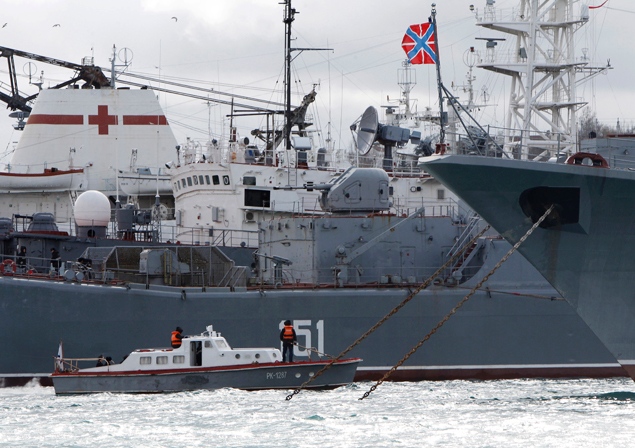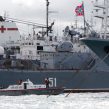
The Internal Political Crisis Increasingly Influences Putin’s Foreign Policy
Publication: Eurasia Daily Monitor Volume: 9 Issue: 118
By:

The Moscow Center of Strategic Studies (CSS) – an influential think tank led by well-known economist, former parliamentarian and first deputy economics minister in Vladimir Putin’s first government, Mikhail Dmitriev – has recently published a report about the ongoing political and economic crisis in Russia. According to sociological research conducted via focus groups, the vast majority of urban-based populations in all regions of Russia demand change. The emerging middle class in Moscow and several other major cities is demanding an independent and non-corrupt judiciary and law enforcement, free speech, and political rights, while the less educated and lower earning masses are more concerned with economic issues, as well as the availability of social services. Still, the protest agendas of the middle class and the broader Russian masses largely coincide: The corrupt police force and crony judicial system cause overall revulsion. Russians are fed up with Putin and his cohorts monopolizing political and economic power. There is a growing urge to see new actors with new ideas in power. The number of loyal “Putinites” in Russia is dramatically dwindling, while a critical mass of devoted anti-Putin activists has emerged primarily in Moscow (novayagazeta.ru, May 25).
The CSS report predicts that the internal political, social and economic crisis will increasingly influence Putin’s foreign policy, foreseeing attempts to “compensate internal political failures with populist foreign policy actions.” Russian foreign policy may turn into an appendix of internal political troubles, becoming “less realistic and increasingly indoctrinated” (novayagazeta.ru, May 25). Instead of pragmatically pursuing Russia’s long-term national interests, Putin’s Kremlin seems bent on pigheadedly confronting the United States on almost any global or regional issue, guessing that the Russian public will approve. The Kremlin is attempting to paint the prodemocracy movement in Russia as a Western (American) plot and part of a global anti-Russian conspiracy.
Riot police officers from a special antiriot OMON unit from Voronezh (a city south of Moscow) were deployed in Moscow last month and brutally attacked prodemocracy protesters. They later told journalists that their own commanders and special “anti-extremist” Interior Ministry agents briefed them in advance about Western spies financing the opposition. The officers believe that Western-paid agents were deployed in the streets of Moscow to provoke trouble (https://kommersant.ru/doc/1951260, June 11). It is possible Putin himself believes this narrative.
Putin’s return to the Kremlin could have been expected to make Russian foreign policy more aggressive and assertive. But what is happening at present seems to be more than anyone predicted, as demonstrated by the increasingly erratic, aggressive and irrational stand on Syria. Reports have been circulating for some time about a possible deployment of Russian combat troops in Syria (see EDM, June 14). In recent days, rumors originating in Russia and abroad have alleged Russian marines and warships were already sailing to Syria or were imminently ready to sail. The reports were denied by authorities, then partially or unofficially confirmed, and then denied again.
The semi-official Iranian Fars news agency reported that joint military exercises involving some 90,000 troops, 400 warplanes and 1,000 tanks from Iran, Russia, China and Syria would be held on Syrian territory and in coastal waters. An armada of Chinese, Russian and Iranian warships, including nuclear submarines and an “aircraft carrier,” would be deployed. The Russian semi-official news agency Interfax immediately reprinted the report and without questioning its validity added, quoting sources in the Russian navy, that a major landing ship, Kaliningrad, from the Baltic Fleet together with similar vessels, Nikolai Filchenkov and the Tsezar Kunikov, from the Black Sea Fleet were prepared to imminently sail with marines on board to the Russian naval base in the Syrian port of Tartus to “defend Russian citizens and infrastructure” (Interfax, June 19).
After some hesitation, the Russian Navy denied entirely the report of the planned exercises or that the landing ships with marines were on their way to Syria. An advisor of the Iranian president, who was visiting Moscow, Bouthaina Shabaan, told journalists the reports of joint military exercises were “false and provocative” (RIA Novosti, June 19). The official Russian government daily accused the West of waging an “information war” against Russia and China by spreading false rumors about an imminent military deployment in Syria to prepare grounds for a Western military intervention (Rossiyskaya Gazeta, June 20). A day passed and another seemingly reliable daily, quoting “two sources in Russia’s power ministries,” reported that the Navy and “other power departments” were preparing for “a campaign in Syria.” Plans were being prepared for a possible deployment of troops to help evacuate Russian military personnel and citizens from the naval base in Tartus and from Syria in general. Foreign Minister Sergei Lavrov is quoted as putting the number of Russian citizens and members of families of Russian women married to Syrians at some 100,000 (Vedomosti, June 21).
Russia’s only aircraft carrier, Admiral Kuznetsov, is not ready for action, and the landing ships, Nikolai Filchenkov and Tsezar Kunikov, cannot carry more that several hundred marines and a handful of pieces of armor (see EDM, June 14). The deputy chief of the Russian Air Force, General Vladimir Gradusov, told journalists that “if ordered by Putin,” the Air Force would provide cover for the Russian ships sent to Syria and help to evacuate Russians (Interfax, June 16). However, the mission may turn out to be difficult, since Russia lacks air bases in the region or a deployable aircraft or helicopter carrier. NATO nations, including Turkey, may decide to close their air space to Russian military flights, making things worse.
Russia’s stubborn defense of the crumbling and bloody Bashar al-Assad regime has long been puzzling observers as irrational and damaging to Russia’s long-term interests in the Arab and Muslim world, while infuriating the West. A deployment of a limited military contingent alongside Assad’s forces under the pretext of defending Russian citizens (the same pretext was used to invade Georgia in 2008) could surely further worsen the situation. Of course, the rationale of such actions may indeed be internal: to boost nationalistic passions by openly confronting the West and, possibly, splitting the opposition protest movement’s leftist, nationalistic and liberal wings. Such a foreign policy, based primarily on internal political considerations, is highly risky; it could easily drag Russia into an overseas conflict that it is not prepared to fight or win. The prospect of bringing into Russia some 100,000 refuges from Syria (if Lavrov’s figures are true) could cause insurmountable political, social and economic problems. Russian leaders may be in deep doubt as to how to proceed, which may explain the on again, off again nature of the presumed Syrian deployment.




